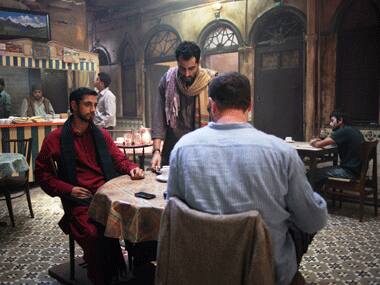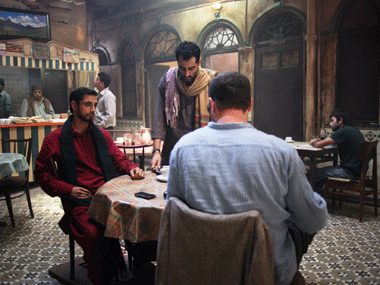“As an inspiration for great art, 9/11 has proved to be a dud,” writes Lakshmi Chaudhry in Firstpost. Some fine non-fiction and documentaries have come out about the post 9/11 world but when it comes to feature films or fiction, whether it’s Oliver Stone’s maudlin World Trade Center or the poorly conceived, self-indulgent, self-styled ‘big’ novels of ideas from the big boys like Ian McEwan, John Updike or Martin Amis, everything has struggled to be profoundly meaningful. Mira Nair’s The Reluctant Fundamentalist does more of the same. The decade-plus that’s elapsed since 9/11 could have given the film a certain emotional clarity. But it’s merely made it look dated. As a colleague said “We don’t just live in a post 9/11 reality. This is a post-Afghanistan, post-Iraq, post Boston Marathon reality.” The Reluctant Fundamentalist may have had greater resonance, say, a decade ago, but the delay is not Nair’s fault. “Investors were not jumping up and down to finance this,” Nair has said in an interview. “I almost gave up on cinema with the constant rejection and the wait of whether we will make this film.” To make a film in Hollywood with a Pakistani man as the lead character is undoubtedly an achievement in itself. And Mira Nair richly deserves a standing ovation for that. [caption id=“attachment_799069” align=“alignleft” width=“380”]  A still from The Reluctant Fundamentalist.[/caption] The real problem here lies in 9/11 itself as a metaphor for cataclysmic change. Changez is the hot-shot young Pakistani whose star shines on a pre-9/11 Wall Street where the only religion is profit. His future is golden, wealthy girlfriend and all, but his American Dream goes belly-up because of the forces of suspicion and paranoia unleashed by 9/11. In fact, while many of us believed that 9/11 was the end of the American Dream, it was not. The great housing crash of 2008 probably had a far more shattering effect on that dream than being strip-searched at the airport after 9/11. The racial profiling at the airport security line that radicalises Changez is itself a vestige of a more black-and-white us vs them kind of post 9/11 world. Even Nair admits that’s not so true anymore outside the airport. “In a city like New York, where I always felt at home, I definitely felt, for a few months after 9/11, more like ‘the other’,” she says in an interview with Vancouver Desi. “I was suddenly conscious of being observed rather than embraced. And then it passed, but this racial profiling goes on when you go through security.” The reality today is more about the confusion and head-scratching that ensues when a teenager like Dzhokhar Tsarnaev, a stoner, lifeguard and highschool wrestler – arguably more Americanized than a Changez – morphs into the Boston Marathon bomber. Making sense of that murkier reality through the prism of the television images of the Twin Towers collapsing just does not work. Even the images themselves, repeated ad nauseum, on our 24x7 television have been leached of the power of that first shuddering impact. If anything, the years since 9/11 have only deepened our sense of ambiguity and contradictions. It has offered up an Obama who has muted Bush’s smoke-them-out-of-their-caves rhetoric but also kept Guantanamo in business and increased the tempo of the drone attacks. It’s not just The Reluctant Fundamentalist that suffers from this out-of-date effect. In the other recent 9/11-themed Zero Dark Thirty, CIA operative Maya’s relentless obsession to hunt down Osama bin Laden feels out-of-whack to her bosses who just want to prevent the next terrorist attack being spawned by a hydra-headed terrorist network and lone wolf operators around the world. And now it turns out, by young disaffected men in Boston as well. Hunting down bin Laden just settles an old score, nothing more. The old score, however, is less interesting than the still-relevant and pressing question raised by Changez in the book which the film does not answer. “I was not at war with America,” says Changez. “Far from it: I was the product of an American university; I was earning a lucrative American salary; I was infatuated with an American woman. So why did part of me desire to see America harmed?” And to complicate the picture further that “desire to see America harmed” isn’t caused by the humiliation meted out to him after 9/11. It predates it. The question is not too incendiary to be at the heart of a mainstream film or television series. The television series Homeland succeeds precisely because it drives home that ambiguity in the post 9/11, post-Iraq world, leaving the viewers feeling uncertain about where they stand from episode to episode. Is Nicholas Brody a terrorist sleeper cell because he’s a closet Muslim? Can the clean-shaven all-American soldier be an Islamic militant’s Trojan horse? And even if he is, does that mean he does not love his country and family anymore? All the options seem frustratingly plausible, tantalizingly uncertain. Nair’s problem is her certainty. She seems to suggest that if only America had not treated men like Changez with suspicion all would have been well with his American Dream. She has no sympathy with the militants who capitalize on that humiliation to recruit jihadists, but the film is resolutely about how America views the other. She has delivered a paean for multiculturalism which is a perfectly fine topic but as Hamid said in an earlier interview with this author, it’s not just about that. He remembered riding the subway in London and noticing a bearded man with a prayer cap in traditional Pakistani dress. It was a crowded train but no one occupied the seat beside him. “I said, look at this racial profiling, and sat down next to him,” recalled Hamid. But then he noticed the man was behaving erratically as if he was mentally unstable. He had a bulge under his shirt probably from a money belt. “I reacted in exactly the same way I criticize other people for reacting to my beard,” he said with rueful smile. “We are all now frightened of this. Even those of us who other people are supposed to be frightened of, even we are frightened of this.” Now that gets at the much more complicated reality of belonging in the world today because the “other” is an ever-shifting target. The Reluctant Fundamentalist tries to find where he belongs by trading one homeland for another because he is bitter that his adopted homeland does not trust him anymore. But the truth is we all live in a Homeland now where we cannot trust anything anymore and all appearances can be deceptive, not just beards.
Can 9/11 work as a metaphor for cataclysmic change? Not unless you accept it has created more ambiguity than certainty . Perhaps that’s why The Reluctant Fundamentalist feels dated as a film.
Advertisement
End of Article


)
)
)
)
)
)
)
)
)



